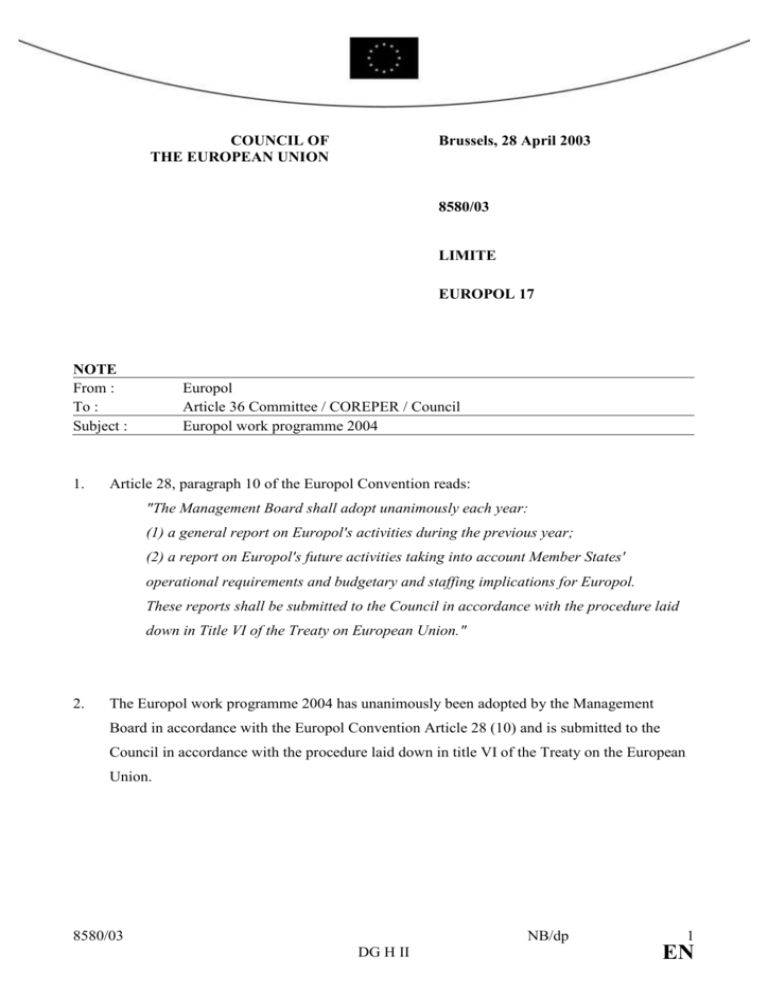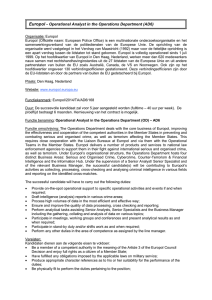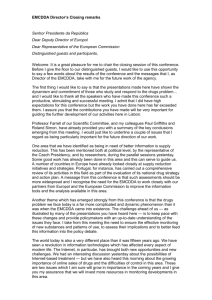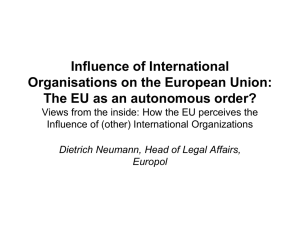europol 17, 8580/03
advertisement

COUNCIL OF THE EUROPEAN UNION Brussels, 28 April 2003 8580/03 LIMITE EUROPOL 17 NOTE From : To : Subject : 1. Europol Article 36 Committee / COREPER / Council Europol work programme 2004 Article 28, paragraph 10 of the Europol Convention reads: "The Management Board shall adopt unanimously each year: (1) a general report on Europol's activities during the previous year; (2) a report on Europol's future activities taking into account Member States' operational requirements and budgetary and staffing implications for Europol. These reports shall be submitted to the Council in accordance with the procedure laid down in Title VI of the Treaty on European Union." 2. The Europol work programme 2004 has unanimously been adopted by the Management Board in accordance with the Europol Convention Article 28 (10) and is submitted to the Council in accordance with the procedure laid down in title VI of the Treaty on the European Union. 8580/03 NB/dp DG H II 1 EN 3. On this basis the Article 36 Committee is requested to submit the Europol work programme 2004 as contained in Annex to COREPER / Council for it to be taken note of and endorsed by Council as soon as possible. 8580/03 NB/dp DG H II 2 EN OUTLINE WORK PROGRAMME 2004 1. INTRODUCTION The following factors will have a major impact on Europol during 2004: Extension of Europol’s Mandate from 1 January 2002 which allows for the definition of new priority areas Revision of Europol’s Vision (Management Board - 2003) Enlargement of the EU from 1 May 2004 (10 new Member States) 2. MAIN OBJECTIVES IN 2004 As a result of these changes and new challenges and from the development of international criminality, as described in the European Union Organised Crime Report, Europol will focus on the following main objectives: 2.1. Europol work related to operational support and investigations To provide in a quick, accurate and efficient manner, actionable information and intelligence, high quality assessment, as well as valuable analytical and other expert support to national trans-border or common international investigations and operations. This will be done in partnership with other law enforcement agencies. The main priority areas will be Terrorism, Drugs (heroin, cocaine, cannabis and synthetic drugs), crimes against persons and Forgery of Money including Euro (Chapter 3). 2.2. Technology Services To further develop and successfully manage an effective Europol Information System, to establish the second generation of the Europol Analytical System (Chapter 4). 8580/03 NB/dp DG H II 3 EN 2.3. Enlargement and other developments of the European Union To prepare the organisation and its customers for the challenges related to the expansion and restructuring of the European Union in order to enhance the mid- and long term performance of Europol (Chapter 5). 2.4. Corporate Governance, Business Excellence and Resources To stabilise and improve the internal working processes by excellence in corporate governance and leadership in intelligence and technology management in a professional surrounding of high competence and accountability. Priority will be given to: Financial Action Plan, Corporate Governance development, Professional Standards and efficient use of Human Resources. The main objectives will have to be linked to the Europol Balanced Scorecard (Chapter 6). 3. EUROPOL WORK RELATED TO OPERATIONAL SUPPORT AND INVESTIGATIONS Most of the organisation’s activities fall within the category of regular activities. These are to be handled using the currently available human and financial resources. In addition the organisation plans a limited number of new projects and activities. Europol is predominately operational and the operational units are expected to dedicate approximately 70% of available resources, particularly manpower to the operational work, 20% to strategic activities and 10% to logistics including administration. High priority is given to improve the internal and external information flow. Resources will be devoted to improve the functionality of information programme and system management. 3.1. Priority activities in areas of criminality The following sections give an overview of the priorities in the various areas of criminalities. The priorities are established by taking into account the European Union perspective and the regional interest which might vary from one area to another. 8580/03 NB/dp DG H II 4 EN However, it should be taken into account that the organisation might need to react on unforeseeable events. This will have an effect on the prioritisation of the activities of Europol as outlined in this Work Programme. 3.1.1. Drugs The main focus will be on combating the production and trafficking of heroin, cocaine, cannabis (and related crimes) and synthetic drugs by providing operational support services e.g analysing information and intelligence. The tracing and combating the diversion and trafficking of precursor chemicals will be further developed. It can be expected that Europol will run several new AWFs and participate in the work of Joint Investigation Teams. Training on the dismantling of illicit production sites will be provided: at Europol, in Member States and in Candidate Countries. In the field of drugs Europol will continue to provide operational support services e.g. analysing information and intelligence. Strategic activities will continue via the production of various reports. Existing manuals and bulletins will be updated. Europol will cooperate in Third Pillar work groups and give advice to both the law enforcement community as well as to the political level. Planned resource allocations (excluding administration): A total of 13 FTEs Combating the production and trafficking of heroin (20%) cocaine (20%) and synthetic drugs (40%) 3.1.2. Strategic activities (20%) Crimes against persons Operational priority areas will be to initiate and support investigations in Illegal Immigration smuggling, in Trafficking in Human Beings (sexual exploitation and illicit use of labour), in Child Abuse (Child Pornography and illicit trade in abandoned children) 8580/03 NB/dp DG H II 5 EN In relation to the Police Chiefs Task Force (PCTF) Action Plan, Europol will provide target oriented and operational support via analytical work files (AWFs) and by seconding experts into investigation teams after careful prioritisation of the threat and importance for the EU and its Member States. Europol will implement a Child Abuse/Child Pornography database within the Europol Information System (EIS)1. Subject to a business case study, short term specific operations in the fields of illegal Immigration and Trafficking in Human Beings. In addition to the work done in the area of homicides linked to organised criminality will continue by developing common investigation tools. Planned resource allocations (excluding administration): A total of 14 FTEs Initiate and support investigations in illegal immigration smuggling (40%) and THB (40%). 3.1.3. Homicides linked to organised criminality and other strategic matters (20%) Counter Terrorism and related activities Terrorism will remain a priority for Europol in 2004. The threat of Islamic terrorism will dictate a significant part of the activities of Counter terrorism work at Europol. The work will however also cover a wider spectrum of terrorism including other groups and organisations active in and posing a threat to the European Union (e.g. to events such as the Olympic Games 2004 in Athens). The Counter Terrorism work at Europol will be divided into two main programmes and three supportive programmes: 1 This issue will be subject for consultation with the Heads of Europol National Units and prior approval by the Management Board 8580/03 NB/dp DG H II 6 EN Main Programmes: Counter Terrorism Programme Counter Proliferation Programme Supportive Programmes: Networking Programme Preparedness programme Training Programme The main focus will be on: 1. Continuation of operational analysis of Islamic Extremist Terrorism 2. Operational projects on other virulent terrorist groups and possible participation in Joint Investigation Teams 3. Regular and incident related threat assessments 4. Financing of terrorism 5. Use of weapons of mass destruction 6. Bio-terrorism 7. Support tools at EU-level Planned resource allocations (excluding administration): A total of 18 FTEs Counter Terrorism Programme (70%), Counter Proliferation Programme (20%) Strategic activities (10%) 3.1.4. Organised Crime (OC) The main focus will be on the most active criminal organisations in the European Union and to produce intelligence on those: criminal groups and organisations from East and South East Europe, Outlaw Motorcycle Gangs and regional organised crime groups. A priority will be to provide support to live investigations by initiating investigations and investigative measures, by organising common operations and investigations, by coordination and analytical support; another major objective will be participation in a support function in joint investigative teams set up by the Member States. 8580/03 NB/dp DG H II 7 EN Europol will continue to coordinate and maintain principal support functions such as witness protection and handling of informants. As information technology and other forms of modern high-tech equipment are increasingly employed by OC groups, efforts are also directed towards building-up and maintaining expertise in this area, creating a network of specialised units in the Member States and further developing expertise in Cyber Crime1 (E.g. supporting internet related investigations providing specific threat assessments, organising training in close cooperation with CEPOL). New Project and Activities: Projects on South-East and Eastern European Organised Crime in specific crime forms and modus operandi Feasibility study for a project related to illicit trafficking of firearms Planned resource allocations (excluding administration): A total of 14 FTEs Providing support in combating organised crime groups (60%) Cyber crime (30%) Strategic activities (10%) EURO currency – Forgery of Money 3.1.5. Europol, as the European Union contact point for the Suppression of Euro Counterfeiting in terms of the Geneva Convention 1929, is and will be a co-ordination and central point for the Member States to inform on investigations and operations relating to counterfeited currencies in general and all countries concerning the Euro. The close co-operation with European Central Bank and other important partners such as the General Secretariat of Interpol will continue. 1 This issue will be subject for consultation with the Heads of Europol National Units and prior approval by the Management Board 8580/03 NB/dp DG H II 8 EN The majority of the activities will be related to operational support by analysis, expertise and co-ordination of investigations and operations by Law Enforcement Agencies of the MS but also Non EU Countries. The use of the existing and further to be developed products, services and procedures agreed with Europol’s partners will be encouraged and strengthened in order to have a standardised approach aiming to better combat the trans-national criminal organisation dealing with currency counterfeiting. Such products and services are: Europol Information System Early Warning Message Situation reports with statistical data, trends and impact Technical investigations Training Information Reward Operational Support and Joint Teams. Emphasis will be put on training initiatives for EU Member States as well as for non EU countries in co-operation with external partners (CEPOL, etc). Financing will be sought from European Commission programmes. Planned resource allocations (excluding administration): A total of 13 FTEs Support of investigations (80%) Strategic activities (20%) 3.1.6. Financial Crimes & Crimes against property Europol priority areas in combating financial crimes are money laundering and specific forms of international fraud such as credit card fraud. The possibility of using methods to support Member States in cut-off financing crime and to freeze the profits arriving from criminal activities will also be promoted. For crimes against property, Europol will concentrate on combating motor vehicle crimes. 8580/03 NB/dp DG H II 9 EN New Project and Activities: Feasibility study with regard of trafficking in cultural property and the possibilities of developing a co-ordination system to help the investigations in Member States concerning major armed robberies in the European Union Planned resource allocations (excluding administration): 3.1.7. A total of 11 FTEs Financial crimes (70%) Crimes against property (30%) Analysis work Analysis work carried out at Europol on internal or external requests will be carefully prioritised in consultation with the Member States especially the HENUs. About 90% of all manpower within the analytical work of Europol will be concentrated on supporting operational projects in order to satisfy the increasing demand from the Member States. Operational analysis includes support to short term specific operations and Joint Teams. Concerning the analytical support it is presumed that with the current resources the number of files is to stay at the level of 2003 (ca. 20) as it is likely that the trend of an increase of quantity of data flowing into the files will continue 10% of total manpower will be devoted to the development of projects in the field of Strategic Analysis, particularly to the EU Organised Crime Situation Report used increasingly by the Law Enforcement Agencies in the EU as a basis for prioritisation of resources, policy developments in the area of JHA and planning of operational projects. Strategic analysis will include ad-hoc assessments for new areas of the Europol mandate, threat and risk assessments prior to short term specific operations and monthly intelligence bulletins. 8580/03 NB/dp DG H II 10 EN Training will refer to both external and internal initiatives. External training on Operational and Strategic Analysis will continue on request after careful consideration of the available resources and in coordination with CEPOL. The training in 2004 will also focus on Financial Analysis and Handling of high volumes of data. Planned resource allocations (excluding administration): A total of 66 FTEs Analytical support (90%) Training and other activities (10%) 3.2. Liaison Bureaux Activities The Europol National Units together with the correspondent Liaison Bureaux and the Non EU States Liaison Bureaux with which Europol has an operational agreement are essential parts of the Europol framework. It is estimated that in 2004 that there will be approximately 80-90 Liaison Officers1 working at the Europol Headquarters providing enormous potential to the successful outcome of our common efforts. It is the responsibility of the organisation to ensure the integration of the new bureaux, at the same time promoting an effective interaction between the different elements working together. The organisation will have its own liaison officers posted to the General Secretariat of Interpol and in the USA. In 2004 more can be expected from these liaison officers as during 2003 the foundation work is expected to have been done. 1 In the Financing Plan 2004-2008, File no: 2210-150, Annexr1 where a number for ELOs, LOs, experts, security etc. is given 160. 8580/03 NB/dp DG H II 11 EN 3.3. Cooperation with other bodies and organs It is expected that Eurojust is fully operative in 2004 and therefore cooperation between Europol and Eurojust will be routine. The two organisations will operate as partners; supporting each other as outlined in the Tampere conclusions of the European Council. Cooperation between the General Secretariat of Interpol and Europol should increase with joint projects. Training activities will be organised more and more via external partners and resources, such as CEPOL and through the use of EU funding. It is expected that Europol and OLAF will participate together in some Joint Actions with Member States in 2004. Europol may expect further requests for support from the PCTF. The work of establishing operational agreements with Thirds States and of developing strategic relationships with key partners will progress further.1 The possibility of cooperating with Southeast European Cooperative Initiative (SECI), the EU-Intervention Police and the different forms of EU Law Enforcement in the Balkans will either be in the implementation phase or must be investigated further. Europol will start together with the Member States concerned to implement the Council decision making possible the common use of their existing Liaison Officer network. Within the field of Public Relations Europol will make efforts to increase the knowledge about the organisation in a transparent way and thereby gaining accountability particularly within the law enforcement community. 1 In line with the MB vision for Europol (2003-2006) 8580/03 NB/dp DG H II 12 EN Together with its Member States (particularly the Europol National Units), Europol will continue to develop its common strategy with and implementation of awareness activities. Support will be provided in the field of crime prevention, in close cooperation with the European Union Crime Prevention Network (EUCPN) and the Commission’s Forum on the Prevention of Organised Crime depending on the available resources. 4. TECHNOLOGY SERVICES THE STRATEGIC AIM OF THE TECHNOLOGY SERVICES DEPARTMENT IS TO SUPPORT EUROPOL IN ITS TASK TO FULFIL THE RESPONSIBILITIES AS STATED IN THE EUROPOL CONVENTION. SUPPORT WILL BE GIVEN IN THE FOLLOWING FIELDS: a. MAINTENANCE ON INFRASTRUCTURE, HARDWARE AND SOFTWARE b. Project and application support c. Operational support 4.1. Europol Information System (EIS) During 2003 the EIS will be developed from a database to collect information on the forgery of money – version 0.2 - to a database for all information related to the responsibility of Europol – version 1.1. As the EIS design includes the translation of free text so that all national units can easily obtain the information which is of relevance for them, this function will be developed and implemented during 2004. 4.2. Analytical System (OASIS) The development of the second generation of the Analysis system and successor of Eurint – OASIS will be completed during 2003. During 2004 it is planned that Europol plays a coordinating role in the application support to the Member States that are interested in obtaining the system for their own national purposes. As far as possible, further needs of the national units will be developed and integrated in the OASIS system during 2004. 8580/03 NB/dp DG H II 13 EN 4.3. Document Management System (DMS) The new DMS will have to be implemented for all the Europol units and all Europol staff will be trained to use the DMS, the ultimate tool to store and retrieve documents. 5. ENLARGEMENT AND OTHER DEVELOPMENTS OF THE EUROPEAN UNION 5.1. The Enlargement and its consequences The enlargement of the EU will have a fundamental effect on the work of Europol during this planning period. The crime situation and threat assessments for the extended geographical area of the EU will be affected. Europol’s working methods have to be compatible to the law enforcement structures. Europol has to adapt to the new languages and the overall composition of staff. Planned resource allocations (excluding administration): A total of 141 FTEs (Analytical work 4, Information Management 2, Supportive and Strategic tasks 3, TECS 5). In particular the following developments have to be reflected: 5.1.1. Information Management The EU enlargement will lead to an increase of data sent by the Member States to Europol. In the first period the new Member States will not have the possibility to input directly data into the Europol Information System. Therefore Europol will be requested to do that on their behalf. Consequently the workload in terms of input and checking data in the EIS and of handling administrative matters will increase accordingly. In order to handle this task Europol will recruit additional Administrative Assistants. 1 It should be noted that these FTE is also indicated in respective area of interest. 8580/03 NB/dp DG H II 14 EN 5.1.2. Analysis As a result of the enlargement the new members of the EU will participate fully in operational projects such as Analytical Work Files with an increasing data input. Furthermore the new member states may initiate new analytical projects and AWFs. In addition the large increase in the geographic and demographic responsibilities of Europol will have a direct impact on strategic reports and threat assessments like the European Union Organised Crime Threat Assessment due to the fact that Europol will receive ten more contributions in different languages to be analysed. For these reasons additional analysts and administrative staff will be recruited in 2004 to process the growth in intelligence and any additional projects. 5.1.3. Information Technology The extension of the EU requires that Europol support the new Member States with connections to the Europol Virtual Private Network, with increased back office hardware and storage capacity. The roll-out schedule for the EIS implementation will be extended and the necessary changes in the EIS will be implemented. The existing Info-Ex system has to be amended for the new liaison offices needs. Particularly the extended ICT roll-out and the technical changes will have a major impact on the enlargement budget requested by Europol. 5.1.4. Training Europol will have to offer for all areas mentioned under 5.1.1 – 5.1.3 new training courses to the new member states. This includes for example all EIS training tasks, training in the complex methodology for threat assessments and in-house training for the new liaison officers situated at Europol. 8580/03 NB/dp DG H II 15 EN Europol’s bodies and organs 5.1.5. The Management Board, JSB and HENU structures will need to absorb and accommodate a vastly increased membership. The up to ten languages will lead to significantly higher costs for translations and interpretation; more participants in the meetings leads to higher travel costs to be reimbursed and finally new meeting facilities have to be found as Europol meeting rooms capacity is not always sufficient for the new requirements. Consequently this will have an effect on the balance between the resources allocated to operational work and administration and support. 5.1.6. Language Management The language management will not only affect Europol’s bodies and organs but all competence areas of Europol. Products and materials intended for the use of local law enforcement (such as the Organised Crime Situation Report or the operating manuals for the EIS) will be translated into the relevant official language which will cause additional budget implications. The described changes will be cumulative with full Europol membership for the candidate countries likely by 2005. 5.2. Legal issues The foreseen ratification of the EU Convention on Mutual Assistance in Criminal Matters will introduce new working methods. The possible amendment of the Europol Convention can furthermore be expected to affect the long-term business planning in providing new opportunities. 5.3. The European Convention The outcome of the European Convention and the subsequent Intergovernmental Conference may affect Europol activities in case that preparation for transformation and implementation is foreseen in 2004. 8580/03 NB/dp DG H II 16 EN 6. CORPORATE GOVERNANCE AND BUSINESS EXCELLENCE 6.1. Corporate Governance The organisational structure has changed. The implementation of the Change Plan will improve the organisations’ internal processes and infrastructure. The implementation of a new document management system during 2003 and shall be finalised in 2004 in order to improve the management of internal preparation process for decision taking. 6.2. Reporting the results The aim is for Europol results to be easily produced and presented in a practical, simple and understandable form. During 2004 the Balanced Scorecard (BSC) in effective combination with the EFQM Excellence Model will show specific qualitative results. These management tools will thus provide comprehensive information about the organisation’s performance. The process to introduce quality control within the organisation initiated in 2003 is expected to continue in 2004. Measurement – methodologies and practice 6.3. Clear and understandable objectives and targets will be agreed; the evaluation methodology and criteria will be chosen in advance, resulting in practical and resource effective measurements being in operation in 2004. In the 2004 Europol BSC, the objectives are defined showing performance and how well the organisation is fulfilling its goals. During 2004 the final objectives for the first full Europol BSC application will be finalised, thereafter all the reporting mechanisms to measure the 22 objectives will be in place for 2005. New political or strategic developments, such as the Management Board’s revised Vision of Europol could change some of the objectives. 8580/03 NB/dp DG H II 17 EN It is anticipated that in 2004 the measurement mechanisms developed in 2003 can be used to show the results for total 17 objectives for the Corporate Scorecard. The results will be given, as far as possible in the form of a comparison. The first 2003 Europol BSC allows for a comparison for first 11 objectives. Meanwhile Europol is also starting benchmarking with similar kinds of Public Administration organisations and Member States Law Enforcement authorities. 7. RESOURCES An important challenge is the planning of the new headquarters for Europol. The detailed planning of the new location has begun in 2003. The planning process however, is long and will require the involvement of all levels of staff; to guarantee the best possible accommodation for Europol. The enlargement of the EU signifies an additional challenge for recruitment and training. The expertise from the new Member States has to be integrated as soon as possible in order to fulfil the new challenges of the enlarged geographical area of Europol. Other important issues for 2004 will be to finalise the improvements made to the financial and human resource administration; to simplify, streamline and optimise efficiency in order to serve Europol, its customers and staff better. ________________ 8580/03 NB/dp DG H II 18 EN





